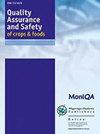柠檬马鞭草叶片在配备太阳能预热系统的连续流干燥器中干燥的数学模型
IF 5.3
3区 农林科学
Q1 FOOD SCIENCE & TECHNOLOGY
引用次数: 6
摘要
在配有太阳能预热系统的连续流干燥器中,在三个干燥温度水平(50、40和30°C)和三个空气速度水平(2、1.5和1 m/s)下对柠檬马鞭草叶的干燥过程进行了建模。在实验过程中,柠檬马鞭草叶在连续流干燥器中从76%湿基干燥至最终含水量为10。干燥动力学表明,干燥温度和空气速度对干燥时间有显著影响。此外,通过测定在干燥器中在不同条件下干燥后产品的精油含量,获得了干燥的柠檬马鞭草叶的质量。最后,观察到最高精油含量保持在40°C的温度和1 m/s的空气速度下。采用10种不同数学干燥模型的适用性来描述在该干燥机中干燥柠檬马鞭草叶。结果表明,Midilli和Kucuk的模型可以成功地预测所有气温和风速下的实验数据。在Midilli和Kucuk的模型中,R2的数量大于999×10–3,均方根误差(RMSE)和卡方误差(χ2)的数量分别小于174×10–4和19×10–4。本文章由计算机程序翻译,如有差异,请以英文原文为准。
Mathematical modelling of lemon verbena leaves drying in a continuous flow dryer equipped with a solar pre-heating system
The modelling of the drying process of lemon verbena leaves in a continuous flow dryer equipped with a solar pre-heating system was performed at three levels of drying temperature (50, 40, and 30 °C) and three levels of air velocity (2, 1.5 and 1 m/s). During the experiments, lemon verbena leaves were dried to the final moisture content of 10 from 76% wet basis in the continuous flow dryer. Drying kinetic showed to drying temperature and air velocity exerted significant influence on the drying time. Also, the dried lemon verbena leaves quality was obtained by determining the essential oil content of the product after drying in different conditions in the dryer. Finally, it was observed that the highest essential oil content was maintained at a temperature of 40 °C and air velocity of 1 m/s. Suitability of 10 different mathematical drying models was used to describe drying lemon verbena leaves in this dryer. The results have shown that Midilli and Kucuk’s model can successfully predict the experimental data in all air temperatures and air velocities. In Midilli and Kucuk’s model, the amounts of R2 were above 999 × 10–3 and the amounts of root- mean-square error (RMSE) and chi-square (χ2) were less than 174 × 10–4 and 19 × 10–4.
求助全文
通过发布文献求助,成功后即可免费获取论文全文。
去求助
来源期刊

Quality Assurance and Safety of Crops & Foods
FOOD SCIENCE & TECHNOLOGY-
CiteScore
4.60
自引率
7.50%
发文量
61
审稿时长
1 months
期刊介绍:
''Quality Assurance and Safety of Crops & Foods'' is an international peer-reviewed journal publishing research and review papers associated with the quality and safety of food and food sources including cereals, grains, oilseeds, fruits, root crops and animal sources. It targets both primary materials and their conversion to human foods. There is a strong focus on the development and application of new analytical tools and their potential for quality assessment, assurance, control and safety. The scope includes issues of risk assessment, traceability, authenticity, food security and socio-economic impacts. Manuscripts presenting novel data and information that are likely to significantly contribute to scientific knowledge in areas of food quality and safety will be considered.
''Quality Assurance and Safety of Crops & Foods'' provides a forum for all those working in the specialist field of food quality and safety to report on the progress and outcomes of their research.
 求助内容:
求助内容: 应助结果提醒方式:
应助结果提醒方式:


